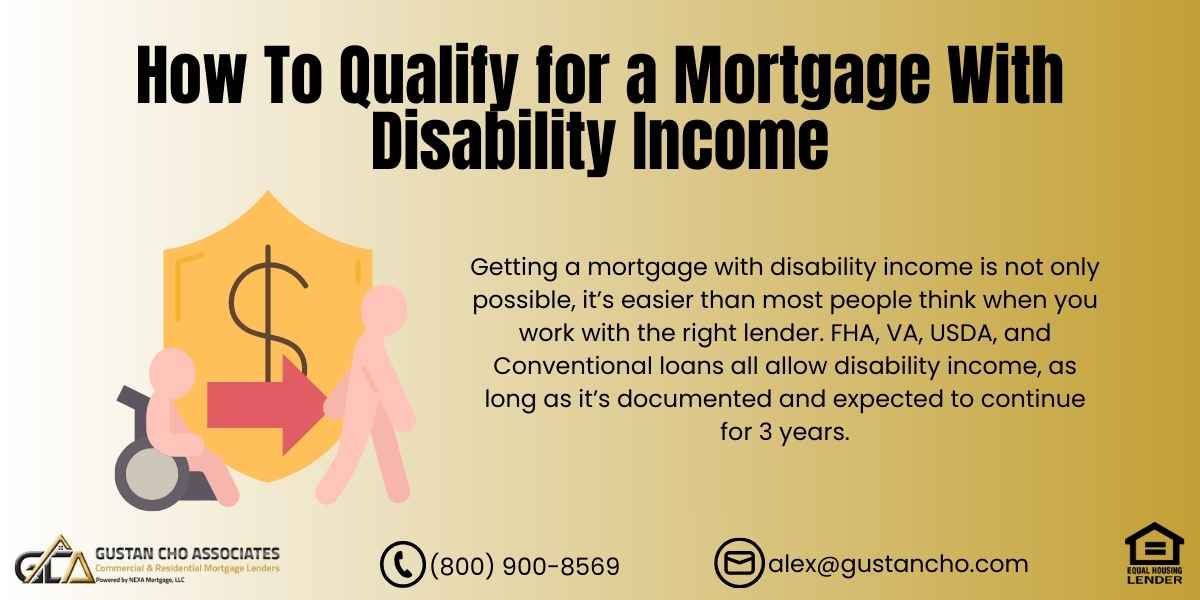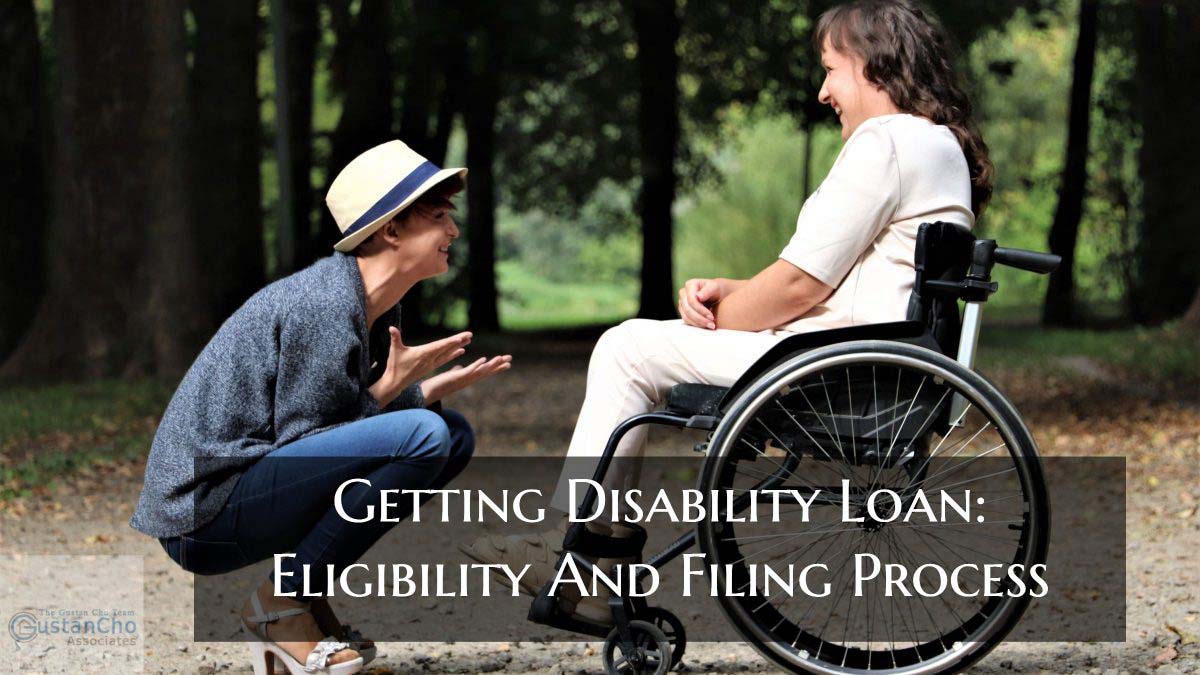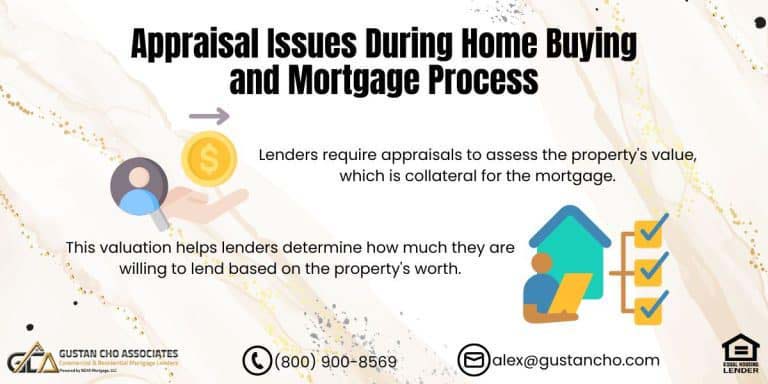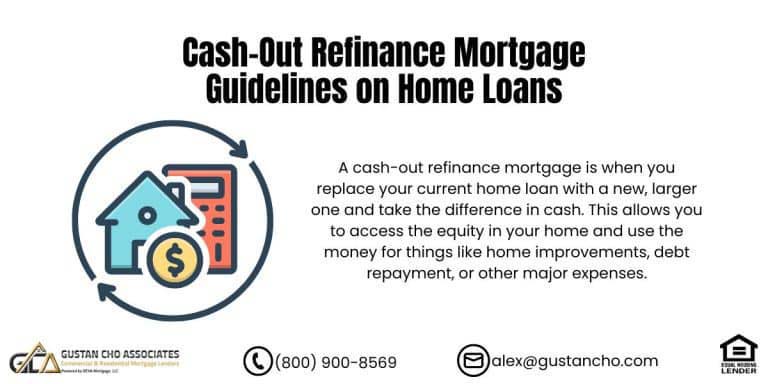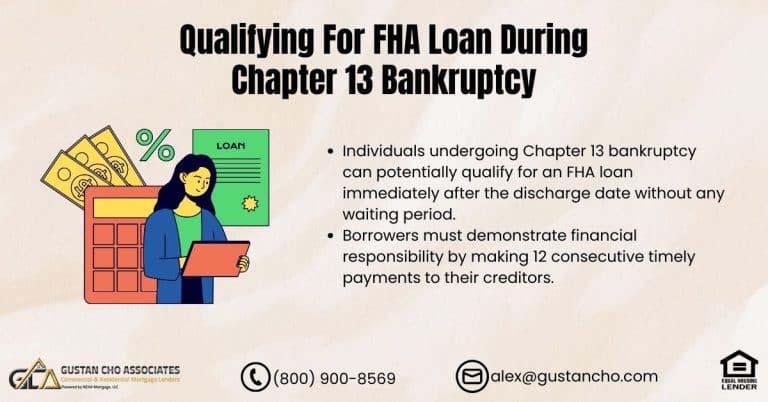Mortgage With Disability Income: How to Qualify in 2025
Buying a home when most or all of your income comes from disability benefits can feel overwhelming. Many wonder if lenders will accept Supplemental Security Income (SSI), Social Security Disability Insurance (SSDI), or VA disability benefits when applying for a mortgage.
The good news? You can qualify for a mortgage with disability income as long as you meet the right documentation and guideline requirements.
At Gustan Cho Associates, we specialize in helping borrowers who have been told “no” elsewhere. This guide breaks down everything you need to know about getting a mortgage with disability income, the loan programs available, the documents you’ll need, and how to increase your chances of approval.
Is it Possible to Get a Mortgage With Disability Income?
Yes. Lenders allow disability income to be used for mortgage qualification, but it must meet two key conditions:
- It must be documented – You’ll need an official award letter, benefit verification, or bank statement showing the disability income being deposited.
- It must likely continue for at least 3 years – SSA guidelines require proof that the income won’t end soon.
This rule applies to all major loan types: FHA, VA, USDA, and Conventional mortgages. Disability income is treated like wages or salary, as long as you can show consistency and continuance.
Yes, You Can Buy a Home on Disability Income
Learn the steps to qualify and get approved today.Types of Disability Income You Can Use for a Mortgage
Not all disability benefits are the same. Lenders generally allow these types of income:
- Social Security Disability Insurance (SSDI) – Regular benefit payments determined by your employment record.
- Supplemental Security Income (SSI) – Needs-based income for people with disabilities and limited resources.
- VA Disability Benefits – Tax-free payments to eligible veterans with service-connected disabilities.
- Private Long-Term Disability Insurance – Benefits from a private or employer-sponsored disability plan.
- State or Local Disability Programs – Some states provide supplemental benefits that may qualify.
Important: Non-taxable disability income (like SSI and VA benefits) can be “grossed up” by 15%–25%. That means lenders may count more income than you actually receive, helping you qualify for a higher loan amount.
FHA Loan With Disability Income
FHA loans are ideal for individuals with disability income due to their flexibility. A credit score of at least 580 and a down payment of only 3.5% make it attainable for a wide range of borrowers, including individuals with lower credit scores. Plus, they’re cool with higher debt-to-income ratios, so some folks might qualify even if their DTI is over 56%.
One of the best things about FHA loans is that they accept disability income as long as you can provide the proper documentation. This also opens the door for family members to help as co-borrowers, which can be super helpful. There might even be down payment assistance programs, making FHA loans appealing for first-time homebuyers or anyone looking to buy a home with tight finances.
VA Loan With Disability Income
If you are a veteran or an active-duty service member considering a mortgage with disability income, the VA loan is an exceptional option. One of its most significant advantages is that it requires no down payment, making it accessible for many who may struggle with upfront costs. Additionally, no monthly mortgage insurance (PMI) is required, which further alleviates financial burdens.
This program is specifically designed to support those who have served, and it recognizes the contributions of veterans by allowing VA disability income to be included in the loan application process.
One awesome perk for disabled veterans is that they don’t have to pay the VA funding fee, which can really save a lot of money over the life of the loan. This makes getting a mortgage with disability income even more attractive, helping to lower the overall costs of buying a home. Overall, the VA loan program helps disabled veterans reach their goal of homeownership, making it a more realistic and affordable option.
Conventional Loan With Disability Income
You can qualify for a Conventional loan using disability income, which is backed by Fannie Mae and Freddie Mac. One of the key requirements is a minimum credit score of 620 or higher. Additionally, these loans have stricter debt-to-income (DTI) limits compared to FHA loans. It is essential to document the disability income, demonstrating that it will continue for at least three years. If the income is non-taxable, it can be grossed up, which may enhance your borrowing capacity.
Conventional loans are often better for those with stronger credit profiles who wish to avoid the mortgage insurance premiums associated with FHA loans. By meeting these criteria and understanding the advantages of Conventional financing, borrowers can make informed decisions that best suit their financial situations
USDA Loan With Disability Income
Thinking about buying a house in the country? A USDA loan might be a great choice, especially if you have disability income. One of the best things about this loan is that you won’t need to make a down payment, making it easier for many people to become homeowners. Remember that there are income limits to consider, which can change depending on where you live and how many people are in your household.
Another advantage of USDA loans is that disability income is treated the same as other types of income, allowing those who rely on disability benefits to qualify without additional hurdles. This program is specifically designed to support buyers in smaller towns and rural communities, providing them with opportunities to secure financing and achieve their dream of homeownership.
Disability Income Counts Toward Mortgage Approval
Find out what documents you need and how lenders look at your income.What Documents Do You Need to Prove Disability Income?
When applying for a mortgage with disability income, lenders want to see:
- SSA Award Letter (for SSDI or SSI).
- VA Disability Award Letter (for veterans)
- Private Disability Insurance Statements.
- Bank Statements showing consistent deposits.
- Tax Returns (sometimes required if income is reported).
The key is showing both proof of amount and proof of continuance. If the income is permanent, most lenders will count it without issue.
How Non-Taxable Disability Income Helps You Qualify
A significant benefit of non-taxable disability income is its potential to be grossed up, which can enhance your qualifying income in the eyes of lenders. For instance, if you receive $1,200 monthly from Supplemental Security Income (SSI), lenders may adjust this to $1,500 after applying the gross-up. This adjustment can be a crucial factor in meeting debt-to-income ratio requirements.
This strategy can ultimately influence your ability to qualify for a home loan. By increasing your reported income, you may have a better chance of obtaining the financing you need, which could be the difference between securing your ideal home and facing denial. Understanding and utilizing this rule can significantly impact your financial prospects.
Tips to Improve Approval Odds for a Mortgage With Disability Income
- Check your credit early – Even though FHA allows scores down to 580, higher scores give you better rates.
- Document everything – Award letters, statements, and deposits must be easy to trace.
- Consider a co-borrower – A family member can help you qualify if needed.
- Reduce other debts – Lower credit card balances improve your DTI ratio.
- Work with a lender with no overlays – Many banks add stricter rules, but Gustan Cho Associates follows standard FHA, VA, USDA, and Conventional guidelines with no additional overlays.
Common Misconceptions About Getting a Mortgage With Disability Income
- “You can’t qualify if you don’t work.”
- False. Disability income is considered stable income if properly documented.
- “You need a huge down payment.”
- That’s incorrect. VA and USDA mortgages do not need any down payment, while FHA loans require only a 3.5% down payment.
- “Lenders won’t count SSI because it’s needs-based.”
- Incorrect. SSI can be used if you show proof of continuance.
- “Having collections or late payments automatically disqualifies you.”
- Incorrect. FHA and VA loans are intended for individuals with imperfect credit..
Why Work With Gustan Cho Associates?
Most banks and credit unions apply lender overlays, which are stricter rules on top of FHA, VA, USDA, and Conventional guidelines. At Gustan Cho Associates, we don’t. We approve borrowers based on the published agency guidelines.
That means:
- We accept 580 credit scores for FHA.
- We allow high DTI ratios if automated underwriting approves.
- We help borrowers who were denied by other lenders.
If you’re looking for a mortgage with disability income, our team specializes in helping families achieve homeownership even when other lenders say no.
Don’t Let Disability Stop Your Homeownership Goals
We help borrowers others turn away.Final Thoughts
Getting a mortgage with disability income is not only possible, it’s easier than most people think when you work with the right lender. FHA, VA, USDA, and Conventional loans all allow disability income, as long as it’s documented and expected to continue for 3 years.
The key is working with an experienced lender like Gustan Cho Associates, who understands the guidelines and won’t add unnecessary restrictions.
Borrowers who need a five-star national mortgage company licensed in 50 states with no overlays and who are experts on mortgage with disability income, please contact us at 800-900-8569, text us for a faster response, or email us at alex@gustancho.com. Whether you receive SSI, SSDI, VA disability benefits, or private disability payments, you can qualify for a mortgage, buy the home you deserve, and enjoy the security of homeownership.
Frequently Asked Questions About Mortgage with Disability Income:
Q: Can I Buy a House with Only Disability Income?
A: Yes. If your disability income is stable, documented, and likely to continue, you can qualify for a mortgage with disability income.
Q: Does SSI Count as Income for a Mortgage?
A: Yes. SSI counts as income, and lenders can gross it up since it’s not taxable.
Q: Can I Get an FHA Loan with Disability Income?
A: Yes. FHA is one of the most flexible programs for borrowers with disability income.
Q: Do VA Loans Allow Disability Income?
A: Yes. VA loans fully accept VA disability benefits, and veterans with disability income are exempt from the funding fee.
Q: Can Non-Taxable Disability Income Help Me Qualify for More?
A: Yes. Lenders can gross up non-taxable income by 15%–25%.
Q: What Documents do I Need to Prove Disability Income?
A: An SSA award letter, VA benefits letter, or bank statements showing deposits.
Q: Do I Need a Co-Signer if I’m on Disability?
A: Not necessarily. But a co-borrower can help if your income is lower.
Q: How Long Does Disability Income Need to Continue for Mortgage Approval?
A: At least 3 years of expected continuance is required.
Q: Can I Refinance with Disability Income?
A: Yes. Disability income can be used for both purchase and refinance loans.
Q: Why Should I Choose Gustan Cho Associates for My Mortgage with Disability Income?
Because we offer no lender overlays, work with all credit types, and help borrowers that other lenders deny.
This article about “Getting Approved For a Mortgage With Disability Income” was updated on August 21st, 2025.


